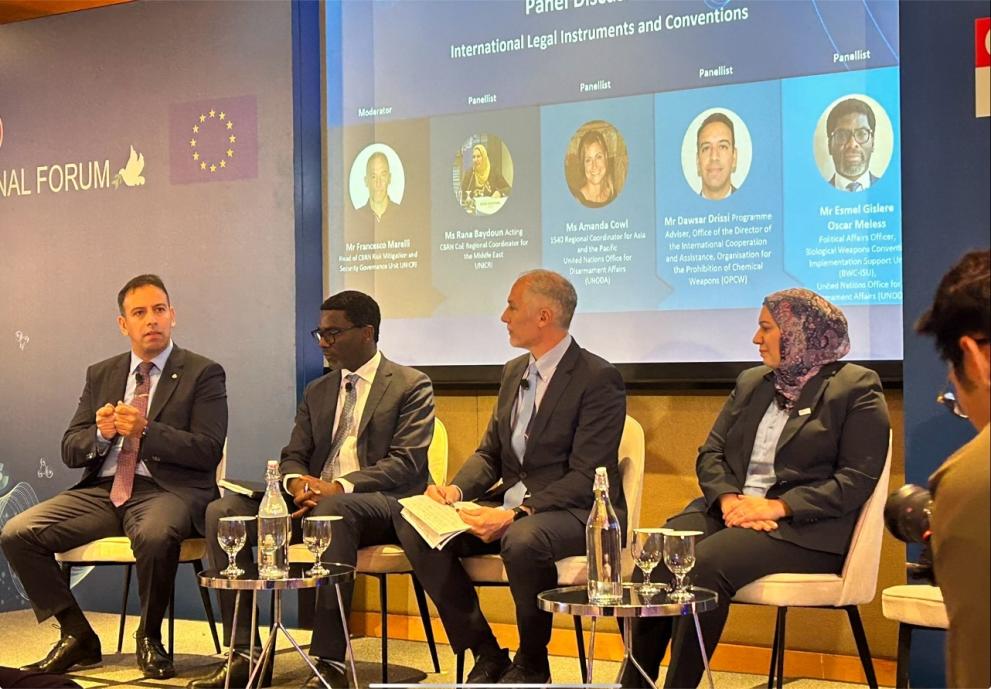
Chemical, biological, radiological and nuclear (CBRN) incidents represent a growing threat to national, regional and global security. In the wrong hands, CBRN materials can be used to cause widespread harm to human, animal and plant health, while undermining trade and generating significant economic costs. CBRN incidents, ranging from radiological and nuclear trafficking by organised criminal groups to chemical attacks by non-state actors, can exceed the capacity of any single country to respond.
Recognising the need to work together to anticipate and respond to CBRN incidents, on 26-27 June 2024, the Republic of Singapore and the European Union (EU) co-chaired an ASEAN Regional Forum (ARF) Workshop dedicated to the Detection, Response, and Deterrence of Chemical, Biological and Radiological Incidents.
The workshop, hosted by Singapore, brought together 80 participants from ARF member countries alongside regional and international partners to exchange experiences with a view to enhancing regional and international cooperation.
During the workshop, presentations and panel discussions featuring leading experts from ARF member countries and international organisations raised awareness on emerging CBRN security challenges, international legal instruments and conventions as well as on-going regional and international cooperation programmes organised by the European Union CBRN Risk Mitigation Centres of Excellence Initiative (EU CBRN CoE), the Network of ASEAN CBR Defence Experts, the ASEAN Mitigation of Biological Threats (MBT) Programme, Regional Cooperative Engagement Office – Indo-Pacific Defense Threat Reduction Agency (DTRA) and the ASEAN Network of Regulatory Bodies on Atomic Energy (ASEANTOM).
Culminating in a table-top exercise (TTX) simulating a hypothetical radiological security incident, the workshop forged stronger ties between ARF member countries, drew attention to the importance of collective action to mitigate CBRN threats and enhanced participants’ capacity to detect, respond and deter future incidents.
The EU CBRN CoE, with the support of the United Nations Interregional Crime and Justice Research Institute (UNICRI), and the Network of ASEAN CBR Defence Experts were proud to have worked together to design and deliver this dynamic and impactful ARF workshop programme.
EU CBRN CoE and Network of ASEAN CBR Defence Experts committed to CBRN risk mitigation
The EU CBRN CoE and the Network of ASEAN CBR Defence Experts are committed to working together to prevent, detect and respond to CBRN incidents. The ARF Workshop on Detection, Response, and Deterrence of Chemical, Biological and Radiological Incidents represents a further example of this shared commitment and on-going cooperation. As underlined in the EU Strategy for Cooperation in the Indo-Pacific, the EU CBRN CoE has been cooperating with ASEAN Member States since 2010. Moreover, it will continue to support partners and regions in strengthening CBRN risk mitigation and all-hazards security governance, following a voluntary and demand-driven approach.
The ARF was established in 1994. It is an important platform for security dialogue in the Indo-Pacific. It provides a setting where members can discuss current security issues and develop cooperative measures to enhance peace and security in the region. The ARF comprises 27 members: the 10 ASEAN Member States (Brunei, Cambodia, Indonesia, Laos, Malaysia, Myanmar, Philippines, Singapore, Thailand and Vietnam); 10 ASEAN Dialogue Partners (Australia, Canada, China, the European Union (EU), India, Japan, New Zealand, the Republic of Korea (ROK), Russia and the United States); and Bangladesh, the Democratic People's Republic of Korea, Mongolia, Pakistan, Sri Lanka, Papua New Guinea, and Timor-Leste.
Details
- Publication date
- 20 July 2024
- Authors
- Service for Foreign Policy Instruments | Joint Research Centre
- CBRN areas
- Bio-safety/bio-security
- Border control and monitoring
- Crisis management
- Denying support for misuse and terrorism
- First response
- Illicit trafficking
- Import/export control
- Investigation and prosecution
- Legal framework
- Post incident recovery
- Protection of material/facilities
- Public and infrastructure protection
- Public health impact mitigation
- Safety and security
- Waste management
- CBRN categories
- Chemical
- Biological
- Radiological
- CoE Region
- SEA - Southeast Asia
